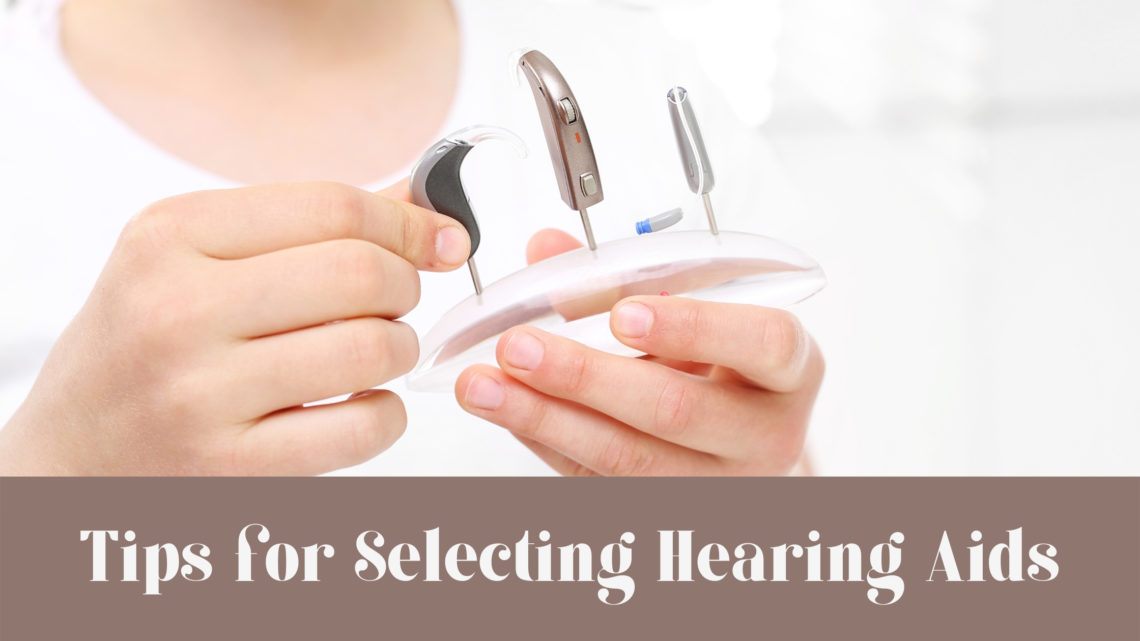Reaching the stage of selecting hearing aids to treat your hearing loss is so exciting! Hearing aids are electronic devices that are designed to absorb, amplify, and process sound. This provides significant support, maximizing hearing capacity which has countless benefits. Hearing aids alleviate hearing loss symptoms, enhancing communication and improving relationships. Like most electronic devices today, hearing aids have experienced innovations that have made them savvier than ever before. There is a wide range of hearing aid types, styles, and features that allow the device to be easily integrated into daily life. With the range of options available, choosing the right one for you can seem like an overwhelming task. To help navigate, it is helpful to consider specific factors that can best inform your decision including the following tips.
- Discuss Hearing Needs with Us
The first step in selecting hearing aids is to establish and discuss your hearing needs with our team. You have likely received a comprehensive hearing assessment which identifies the type and degree of hearing loss you are experiencing. We are equipped with the expertise and experience to treat hearing loss and are able to recommend the most effective solutions. It is important to understand the type of hearing loss you have, the types of sounds you experience more difficulty hearing, and if both ears share the same degree of impairment. Your audiologist is able to make recommendations for hearing aid types that will address your specific hearing loss.
- Identify Budget
There is a wide price range for the various hearing aid types that are available. Prices can depend on the features, technologies, accessories, and model of hearing aid you are interested in. Be sure to check-in with your insurance provider to see if any coverage is available for hearing aid devices. Taking the time to think through and establish your budget can really help inform your decision. It can help you filter through options and better identify what you need.
- Understand the Different Hearing Aid Types
All hearing aids consist of the same basic components: microphone, amplifier, receiver, and power source. The most common hearing aid types include the following:
- In the Ear Types: these types of hearing aids involve pieces that sit at various points in the ear. This includes ITE (in the ear) which is worn in the outer portion of the ear and a piece that sits in the lower portion of the ear. Other types are:
- In the Canal (ITC): custom earmolds are taken to make the shell that sits in the ear canal opening.
- Completely in the Ear Canal (CIC): these types of hearing aids are designed to be worn in the ear canal.
- Invisible in the Canal (IIC): similar to other types but are designed to sit deeply in the ear canal.
- Behind the Ear Types:
- Behind the Ear (BTE): worn behind the ear or on the top portion of the outer ear. A small tube connects it to a custom ear piece that is worn in the ear canal.
- Mini Behind the Ear (Mini BTE): similar to the BTE, this device involves a plastic tube that connects to a smaller earbud that sits in the ear canal.
Knowing these differences can be a useful way to navigate your options. Some of these types work more effectively for specific kinds of hearing loss which your audiologist can discuss with you.
- Know About Features
In addition to knowing about different types of hearing aids, it is helpful to know about key features that can maximize your hearing and experience. This includes: Bluetooth technology, noise cancellation features, rechargeable batteries, voice recognition technology etc. These features allow hearing aids to easily integrate into daily life and connect with other devices seamlessly. Be sure to discuss the range of features that could be most beneficial for you.
- Consider Lifestyle
Lastly, it is important to think about important lifestyle factors. This can include what you do for work, social activities, hobbies, sports, travel etc. These factors help inform the type of hearing aid that could best accommodate your daily life and the various environments you regularly navigate!

